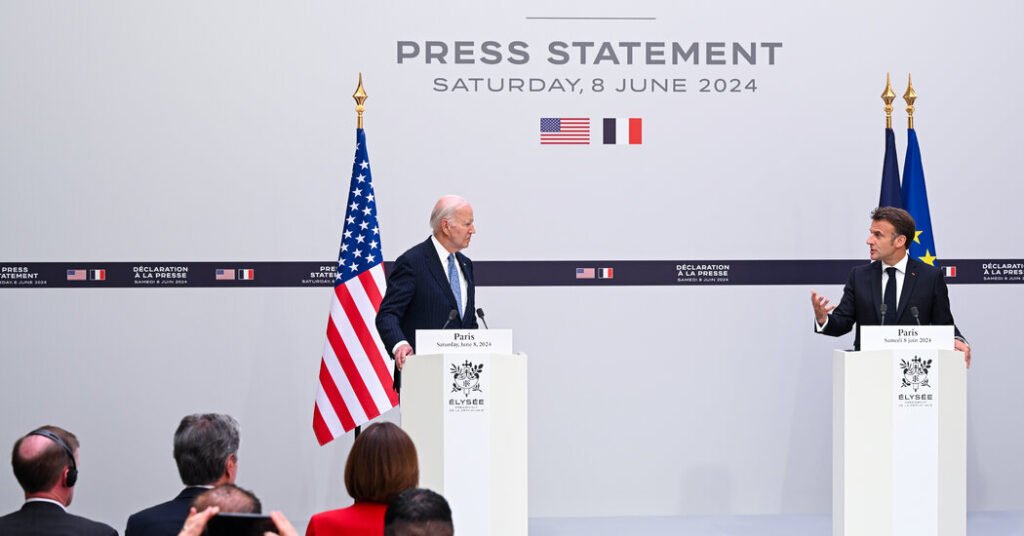President Biden and French President Emmanuel Macron on Saturday emphasized how much they agree with each other on global affairs, including the war in Ukraine, despite the two countries expressing starkly different views on the fighting in Gaza between Israel and Hamas.
The two presidents appeared briefly before reporters just hours after two days of commemorations of the Normandy landings and before a lavish state dinner at the Elysee Palace in Paris, but they took no questions and glossed over their apparent differences over the Middle East. Instead, they touted the enduring strength of the U.S.-French partnership on climate, the economy, European security and cultural ties.
“Today, I proudly stand with France in support of freedom and democracy around the world,” Biden told the two men as they emerged from private talks at the Elysee Palace.
“We are united on this escalating war in Ukraine,” Macron said, referring to the Group of Seven industrialized nations, adding: “I hope that all G7 members will agree to a $50 billion solidarity fund for Ukraine.”
The French president’s comments suggested the two leaders had reached an agreement on a plan to use proceeds from frozen Russian assets to provide up to $50 billion in advance loans to Ukraine. U.S. officials had said ahead of the meeting that France was resisting such a plan and hoped to gain support during his visit to Paris.
On the issue of Gaza, President Macron said his government supports the Israeli ceasefire proposal, which President Biden strongly supports, but he also directly called on the Israeli government to step up support for the Palestinians suffering under Israeli bombings.
“It is unacceptable that Israel has not opened all its crossings for humanitarian assistance, despite months of requests from the international community,” Macron said. He said Israel’s operations in Gaza “must be stopped.”
France supports the International Criminal Court’s decision to seek arrest warrants for Israeli Prime Minister Benjamin Netanyahu and Hamas leader Yahya Sinwar in the Gaza Strip. Biden, by contrast, condemned the move and said it was unfair to compare the two leaders. France also voted at the United Nations in May to recognize Palestine as a full member state of the UN, a move opposed by the United States.
Neither Biden nor Macron mentioned any differences over the conflict between Israel and Hamas.
In a departure from normal practice when a U.S. president meets with a foreign leader, French and U.S. reporters were not allowed to ask questions after Saturday’s statement, which lasted a combined 16 minutes. Typically, both leaders allow at least two questions to reporters from their respective countries.
White House national security spokesman John Kirby on Saturday refused to explain why that wasn’t the case.
“This is something that has been arranged,” he told reporters earlier this week. “As you know, it’s all been discussed between the two sides in the bilateral meetings and this state visit. In the discussions and planning for this visit, it was decided that they would issue a statement to the media.”
Macron’s warm embrace of Biden despite tensions marked a stark contrast to the mood during President Donald Trump’s visit to Paris in November 2018. Minutes before Air Force One landed in Paris, Trump posted a message online calling Macron “highly insulting.” Macron later delivered a speech denouncing nationalism, just weeks after Trump had declared himself an American nationalist.
By contrast, Macron on Saturday praised Biden as a “partner that respects Europe,” in what sounded like a departure from Trump, who has often derided European leaders. “Thank you for being on Europe’s side,” Macron said.
“You’ve become good friends,” Biden responded.

